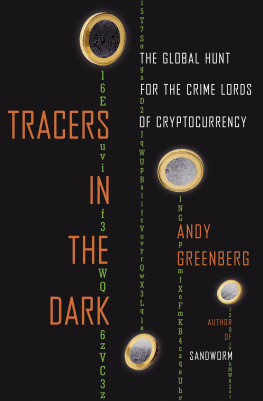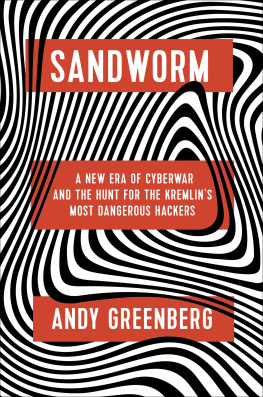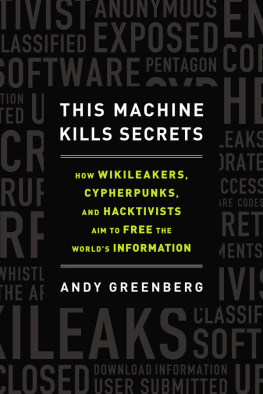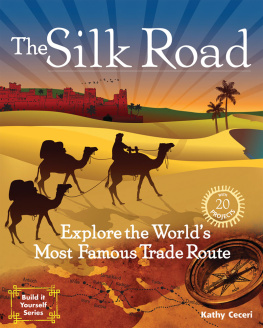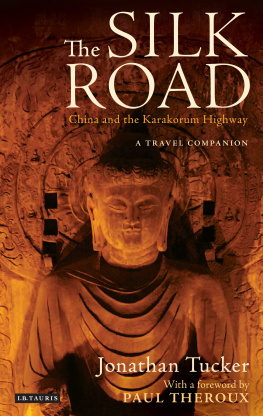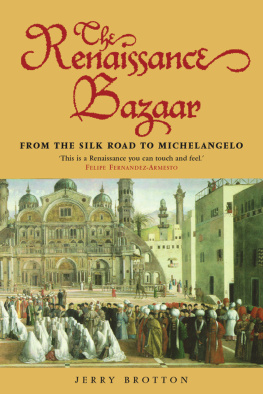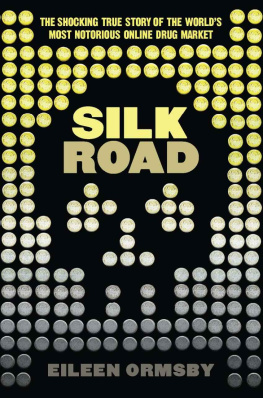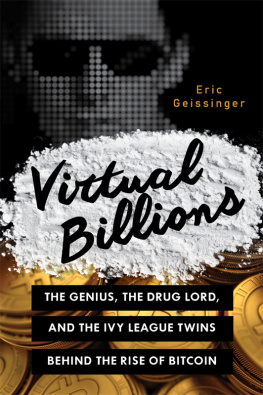Unmasked: The Man Behind The Silk Road
Andy Greenberg, Ryan Mac, Kashmir Hill, Sarah Jeong and Susie Cagle
Copyright 2015 Forbes. All rights reserved.
Cover Design: Uyen Cao
Edited by Annabel Lau, Miguel Morales and Jennifer Eum
CONTENTS
INTRODUCTION
I remember the moment I heard about Ross William Ulbrichts arrest. Holed up in my San Francisco apartment on a gray Wednesday morning in October 2012, I was still asleep when a deluge of messages and emails to my iPhone forced me awake. With bleary eyes, I read the FBIs announcement that it had arrested the ringleader of the Silk Road, a massive illicit online drug marketplace that Forbes had been tracking for the better part of a year. Incredibly, that criminal mastermindalleged at the time to be Ulbrichthad been detained at a public library just a few miles from my home.
I hobbled over to my desk and fired off a few emails to other Forbes reporters before realizing that Andy Greenberg, our staff writer who covered the Internets underbelly, was away on a book tour in Eastern Europe. After several attempts to reach him in Bulgaria, where spotty cell service from the backseat of his car made communication impossible, I set out on my own, trying to figure out just who Ulbricht was and his level of involvement with the Silk Road.
Five hours later I had banged out my first piece on the alleged online drug lord, who federal authorities estimated oversaw $1.2 billion worth of sales in the crypto-currency Bitcoin by the time of his arrest. (That number has been adjusted as the price of Bitcoin has dropped over the last three years.) In the criminal complaint against Ulbricht, the FBI called the Silk Road the most sophisticated and extensive criminal marketplace on the Internet today, a stunning, impressive accusation for a website supposedly created by a 29-year-old University of Texas, Dallas graduate who had little prior trouble with the law.
Thus began my trip down a rabbit hole that has helped define Forbes coverage of the Silk Road. For more than two years, Forbes writers and contributorsincluding Andy Greenberg, Kashmir Hill, Kate Vinton, Runa Sandvik, Sarah Jeong, Susie Cagle and myselfhave watched and reported closely on the developments surrounding the Dark Webs most notorious marketplace, from its days as an online boomtown hawking black tar heroin and ecstasy to its shutdown to Ulbrichts imprisonment and subsequent trial.
With hindsight, its easy to see why the Silk Road tale caught Forbes attention. First and foremost, this was a business. Though much of what the Silk Road was doing was highly illegal, one begrudgingly admires the entrepreneurial spirit of its leader, the self-styled Dread Pirate Roberts. The sheer amount of commerce facilitated by the Dark Web marketplace conveyed the pent-up demand for illicit goods worldwide and the lengths people were willing to go to get them.
Second, we were struck by the idealism of it all. The Silk Road was an exercise in complete freedom from the State, a place where libertarianism reigned and economic principles defined human interactioneven if all of those humans were hidden behind computers and the online-identity-anonymizing software, Tor. In early posts on the Silk Roads forum, the Dread Pirate Roberts waxed lyrical about libertarian principles and how the Silk Roads mechanics, which relied on customer and seller ratings, weeded out bad actors. At its core, Silk Road is a way to get around regulation from the State, said the sites leader in an interview with Greenberg on July 4, 2013. If they say we cant buy and sell certain things, well do it anyway and suffer no abuse from them. But the State tries to control nearly every aspect of our lives, not just drug use.
Finally, the Silk Road saga played out like surreal fantasy. In many ways, the Silk Road story resembled a spinoff of Breaking Bad, a Hollywood yarn whose drama centered around an Amazon-like website that could send cocaine and fake passports through the U.S. Postal Service to a consumers front door. There was the charismatic leader who eluded authorities behind a computer screen and the mystified, frustrated federal agents, who eventually brought it all to an end with a highly publicized sting in the science fiction section of a San Francisco public library. Through the trial, we learned of Ulbricht as well as the staged murders, the money laundering, drug trafficking and constant blackmail that all figured into Silk Roads short but fascinating existence.
Still, the Silk Road story is far from over. Despite a New York jury declaring Ulbricht guilty on counts of drug trafficking, computer hacking, money laundering and running an organized crime ring in February, his lawyers are working on a possible appeal. That may have legs as well, as a new wrinkle in the investigation revealed that two federal agents allegedly laundered Bitcoins confiscated from the Silk Road to their own personal bank accounts. The government claims that one of those agents created fake online personas to blackmail and extort the Dread Pirate Roberts. There have also been a number of sites to pop up on the Dark Web to fill the illegal narcotics void, the metaphorical hydra heads that have replaced the severed original. One, Silk Road 2.0, has already flourished and collapsed after the U.S. government raided the sitemaking for an offshoot tale that may prove just as compelling as that of its predecessor. In that sense, the Silk Roads impact has been undeniable. In the Dread Pirate Roberts own words: The jungle has never seen a species quite like the Silk Road.
Ryan Mac
I. The Silk Road
FOUNDER OF DRUG SITE SILK ROAD SAYS BITCOIN BOOMS AND BUSTS WONT KILL HIS BLACK MARKET
By Andy Greenberg
April 16, 2013
As the crypto-currency Bitcoin has skyrocketed in value over the last weeks and then fallen even faster, its produced plenty of excitement and heartache for investors. But at least one Bitcoin enthusiast has been nonplussed by Bitcoins volatility: the entrepreneur who goes by the name the Dread Pirate Roberts, founder of the black market site Silk Road, where visitors can use Bitcoins to buy practically any illegal drug imaginable.
In a rare (and brief) public statement sent to me, the Dread Pirate Roberts (DPR) said that despite Silk Roads reliance on Bitcoin, commerce on the site hasnt been seriously hurt by Bitcoins wild rise and fall. Bitcoins foundation, its algorithms and network, dont change with the exchange rate, the pseudonymous site administrator writes. It is just as important to the functioning of Silk Road at $1 as it is at $1,000. A rapidly changing price does have some effect, but its not as big as you might think.
Silk Roads customers, after all, arent generally interested in Bitcoins worth as an investment vehicle, so much as in how it makes it possible to privately buy heroin, cocaine, pills or marijuana. They use Bitcoin because its not issued or stored by banks and doesnt require any online registrations and thus offers a certain amount of anonymity. (While those privacy protections are far from perfect, they can be increased by using so-called laundry services that mix users Bitcoins together and reissue them random ones to make any individual coin harder to trace.)
Silk Road has built-in protections against Bitcoins spikes and crashes. Although purchases on Silk Road can only be made with Bitcoin, sellers on the site have the option to peg their prices to the dollar, automatically adjusting them based on Bitcoins current exchange rate as defined by the central Bitcoin exchange Mt. Gox. To insulate those sellers against Bitcoin fluctuations, the eBay-like drug site also offers a hedging service. Sales are held in escrow until buyers receive their orders via mail, and vendors are given the choice to turn on a setting that pegs the escrows value to the dollar, with Silk Road itself covering any losses or taking any gains from Bitcoins swings in value that occur while the drugs are in transit. So while Bitcoins crash last week from $237 to less than $100 means that the Dread Pirate Roberts was likely forced to pay out much of the extra gains Silk Road made from Bitcoins rise, most of his sellers were protected from those price changes and continued to trade their drugs for Bitcoins despite the currencys plummeting value.


